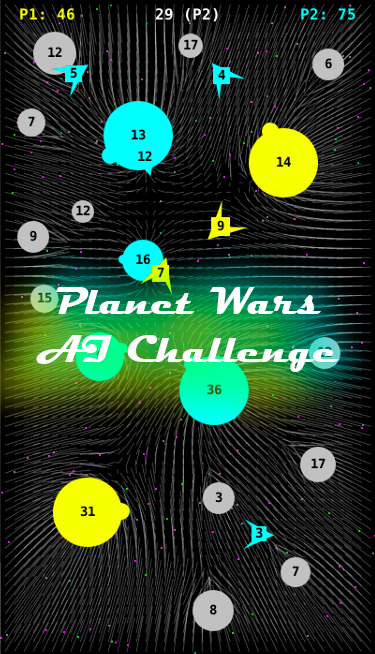
Introduction
This short paper describes a new platform for Game AI research based on variations of the Planet Wars game. The platform has been designed from the ground up for speed and f lexibility. The core game has a fast forward model and an efficiently copyable game state,1 and is therefore ideal for statistical forward planning algorithms. Furthermore, it has many options which are all bundled into a single parameter object, so that the details of the game can be changed dynamically within different copies of the game.
This enables the effects of inaccurate forward models to be systematically investigated, and also makes it well suited to research into automated game tuning. The games are directly playable by General Video Game AI (GVGAI) agents, therefore adding games with strategic depth to that platform. This is particularly useful for extending the type of games offered by the GVGAI 2-player track, but can also be used for the single player tracks by providing one or more f ixed opponents. Finally, the game has also been designed to be fun for human players.
The last decade has seen increasing interest in testing AI on Real-Time Strategy games, with StarCraft being an obvious example. There is also an important place for simpler and faster games, which not only offer more convenient experimentation but can be easily varied to provide more general and varied AI challenges than can be offered by a single game. Recent examples include microRTS and ELF. Compared to microRTS and ELF, the game described in this paper runs around ten times faster due to the simpler rules of the game, and specifically due to design decisions which limit the number of game entities in play at any one time. Compared to the stripped down version described in the platform in this paper offers more sophisticated game play as described below, and introduces the additional features of spinning turrets and a gravity field.
The competition aims to evaluate agents designed to play variants of Planet Wars, a simple but challenging two-player RTS game. The software for the competition will be an updated version of the framework described in this paper: Planet Wars: A Real-Time Strategy Game Framework for AI Research (published at the IEEE CIG Conference 2018).
The updated game software will be released in February 2025, allowing participants to experiment with it before the competition. Rankings will be determined using held-out maps to prevent AI agents from overfitting to specific map layouts.
Logistics
We plan to run two versions of the competition:
Fully Observable Version: Players can see the full game state
Partially Observable Version: Players cannot observe the number of ships on enemy-occupied planets.
The live practice league format, successfully used in the General Video Game AI competitions, will also be employed here. However, this competition features a more complex and challenging game environment. By leveraging Docker images and automated GitHub integration, we will enable a smooth submission and evaluation process, supporting submissions in any programming language capable of interfacing with the server via JSON messages.
Prizes
To be announced. We aim to have prizes sponsored by the IEEE Computational Intelligence Society.
Participants
Participants will submit their entries byproviding a GitHub repository URL and a commit hash. The competition software will then download the specified version and execute it within a Docker container. Entrants will be able to view their rankings in a practice league prior to the finals.
Timeline
August 27, AoE (UTC-12)
Organizers
Simon Lucas
Email: simon.lucas@qmul.ac.uk
